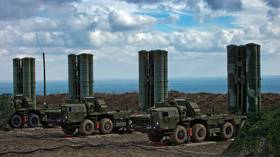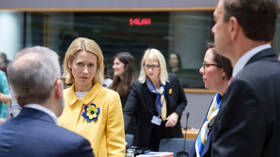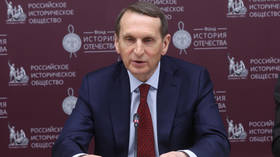US to begin INF Treaty withdrawal from February 2, Washington confirms
The US will begin its withdrawal from the Intermediate-Range Nuclear Forces Treaty with Russia on February 2, Under Secretary of State for Arms Control Andrea Thompson told NATO officials in Brussels.
Washington’s unilateral withdrawal from the treaty – originally signed by the United States and Russia in 1987 – comes after negotiations in Geneva, Switzerland, fell through on Tuesday. Thompson claimed that Russia is in breach of the treaty, and that Moscow’s 9M729 missile system violates the terms of the agreement.
Also on rt.com US & Russia trade blame on INF as last-ditch talks to save nuclear treaty fail in GenevaUnder the agreement, signed by Ronald Reagan and Mikhail Gorbachev in 1987, land-launched nuclear missiles with a range between 500 and 5,500 km are banned. Washington claims, without evidence, that the 9M729 has a range greater than 500 km and is therefore in violation of the treaty.
The Russian delegation at Geneva accused the US of “exacerbating the situation,” and Deputy Foreign Minister Sergey Ryabkov told reporters that “Russia is strictly complying with the INF Treaty.”
Russia “has no interest in a new arms race” with the US, President Vladimir Putin said in an interview published on Wednesday, but warned the Trump administration against withdrawing from the treaty, saying “such a course will have the gravest consequences.”
Trump first threatened to pull out of the landmark agreement last October, telling reporters “we’ll have to develop those weapons.” Reacting to Trump’s announcement, Gorbachev issued a warning similar to Putin's, calling Trump’s planned withdrawal a “dire threat to peace.”
It turns out that US-Russia meet in Geneva on #INF treaty was totally pro forma exercise. Its failure is the last nail in the treaty’s coffin. Formal funeral will come soon. Bad news for NewSTART when it expires in 2 yrs time. #OutofArmsControl
— Dmitri Trenin (@DmitriTrenin) January 15, 2019
US Ambassador to NATO Kay Bailey Hutchison said on Wednesday that Russia will have six months after the US withdrawal to prove compliance with the treaty, if Moscow wishes to preserve the agreement.
The INF treaty was penned at a time when the United States and Soviet Union were the world’s chief nuclear competitors. Visiting Moscow in October, Trump's national security adviser John Bolton revealed that Washington feels hamstrung by the treaty, because it applies only to Europe and does not restrict rising powers like China.
“There’s a new strategic reality out there,” Bolton told reporters, describing the INF as a Cold War relic, a “bilateral treaty in a multipolar ballistic missile world,” that does not apply to countries like China, Iran or North Korea.
Russia has suggested that rather than dropping the agreement, both sides could negotiate expanding it to include China, Iran, North Korea and other states thought to possess short- and intermediate-range missiles.
Subscribe to RT newsletter to get stories the mainstream media won’t tell you.















